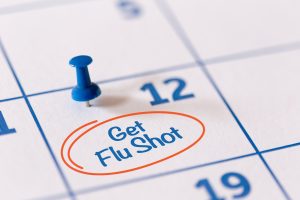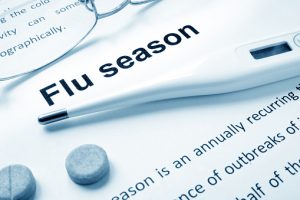 DOVER — The Division of Public Health (DPH) is announcing two laboratory-confirmed cases of influenza, just three weeks before the official start of the 2018-2019 flu season, which begins September 30. Two women, one 50 years old from Sussex County, and one 70 years old from New Castle County, were diagnosed with the flu within the last week. Both were diagnosed with A strain influenza; neither was hospitalized. During the 2017-2018 flu season, Delaware recorded 9,041 flu cases, (including the above) the highest number of laboratory-confirmed flu cases since record keeping began in 2005, and 35 flu-related deaths. Last season’s first flu cases were not confirmed until late October.
DOVER — The Division of Public Health (DPH) is announcing two laboratory-confirmed cases of influenza, just three weeks before the official start of the 2018-2019 flu season, which begins September 30. Two women, one 50 years old from Sussex County, and one 70 years old from New Castle County, were diagnosed with the flu within the last week. Both were diagnosed with A strain influenza; neither was hospitalized. During the 2017-2018 flu season, Delaware recorded 9,041 flu cases, (including the above) the highest number of laboratory-confirmed flu cases since record keeping began in 2005, and 35 flu-related deaths. Last season’s first flu cases were not confirmed until late October.
“While it is unusual to see flu occur this early, we should not rush to assume that means this coming season will be a harsh one,” said DPH Director Dr. Karyl Rattay. “The flu is unpredictable. But what is predictable is that getting your annual flu vaccine can prevent you from getting the flu, and from spreading it to family, friends, neighbors and co-workers. The flu is highly contagious and can even be deadly so we urge you to get your flu vaccine now. It is not too early.”
The flu vaccine is recommended for Delawareans 6 months of age and older. Since it takes about two weeks after vaccination for antibodies that protect against influenza virus infection to develop in the body, it is important to get vaccinated as early as possible to give your body time to build immunity. Getting the flu vaccine now will also provide protection during the entire flu season.
On Friday, Oct. 5, DPH will hold a free flu clinic at the Porter State Service Center, 511 W. 8th St., Wilmington, from 10:00 a.m. to 2:30 p.m. The first 200 people to get their flu vaccines will receive a free gift card. On Tuesday, Oct. 9, DPH will hold a drive-thru flu clinic at the DelDOT Administration Building, 800 S. Bay Road, Dover, from 7:00 a.m. to 6:00 p.m. or until vaccines run out. Eagle 97.7 and Cool 101.3 will hold live broadcasts. Both clinics will be held rain or shine.
DPH will also offer various other flu clinics throughout the season. A schedule can be found at https://dhss.delaware.gov/dhss/dph/fluclinics.html. Flu vaccines are also offered through physician offices, many pharmacies and some grocery stores. To locate where flu vaccines near you are being offered, Google “CDC flu finder” and enter a ZIP code.
The flu is easy to transmit and you can get it even from seemingly healthy, but unvaccinated, children and adults. Vaccinations not only prevent people from getting the flu, but they can also reduce the severity of flu illness and prevent visits to the doctor, clinic, emergency room, along with hospitalizations and serious consequences (including death) from influenza. Vaccinated people have less chance of missing family, school and work events due to influenza illness.
In addition to getting an annual flu shot, Delawareans can prevent the spread of the flu and other respiratory illness with good hygiene: Wash hands frequently with soap and water or use alcohol-based hand sanitizers, cover coughs and sneezes with a tissue, and dispose of tissues immediately. If a tissue is not available, cough or sneeze into your inner elbow. Droplets from a sneeze can travel up to six feet. Also avoid touching your eyes, nose or mouth. Keep your distance from people who are coughing or sneezing.
Flu symptoms come on suddenly, and include fever, cough, sore throat, runny or stuffy nose, headaches and body aches, chills and fatigue. Some people get complications including pneumonia, bronchitis, and sinus and ear infections. Those sick with the flu should stay home from work, school and other gatherings and not return until they have been free of fever — with temperature less than 100 degrees F (37.8 degrees C), without the use of fever-reducing medications for at least 24 hours.
They should avoid close contact with well people in the household and stay well-hydrated by drinking plenty of water and other clear liquids. Over-the-counter medicines can provide symptom relief but if you suspect you have influenza, call your doctor as they may decide to provide antiviral medications to help hasten recovery and prevent serious complications. This is particularly important for those who feel very sick, are pregnant or have chronic medical conditions.
For more information about the flu and where to get vaccinated, visit flu.delaware.gov or call 1-800-282-8672.
A person who is deaf, hard-of-hearing, deaf-blind or speech-disabled can call the DPH phone number above by using TTY services. Dial 7-1-1 or 800-232-5460 to type your conversation to a relay operator, who reads your conversation to a hearing person at DPH. The relay operator types the hearing person’s spoken words back to the TTY user. To learn more about TTY availability in Delaware, visit http://delawarerelay.com.
Delaware Health and Social Services is committed to improving the quality of the lives of Delaware’s citizens by promoting health and well-being, fostering self-sufficiency, and protecting vulnerable populations. DPH, a division of DHSS, urges Delawareans to make healthier choices with the 5-2-1 Almost None campaign: eat 5 or more fruits and vegetables each day, have no more than 2 hours of recreational screen time each day (includes TV, computer, gaming), get 1 or more hours of physical activity each day, and drink almost no sugary beverages.
 ted only at a young age, although infants less than 1 year of age have the highest rates of complications. Whooping cough often makes babies and young children so sick that they need to be hospitalized. Older children, adults, vaccinated individuals and those who have had whooping cough in the past may experience a milder illness, but can still spread the disease to younger members of the community, some of whom may be too young to be fully vaccinated. An infected person can spread the disease starting when symptoms begin to three weeks after the onset of coughing. Coughing frequently lasts for several weeks.
ted only at a young age, although infants less than 1 year of age have the highest rates of complications. Whooping cough often makes babies and young children so sick that they need to be hospitalized. Older children, adults, vaccinated individuals and those who have had whooping cough in the past may experience a milder illness, but can still spread the disease to younger members of the community, some of whom may be too young to be fully vaccinated. An infected person can spread the disease starting when symptoms begin to three weeks after the onset of coughing. Coughing frequently lasts for several weeks.
